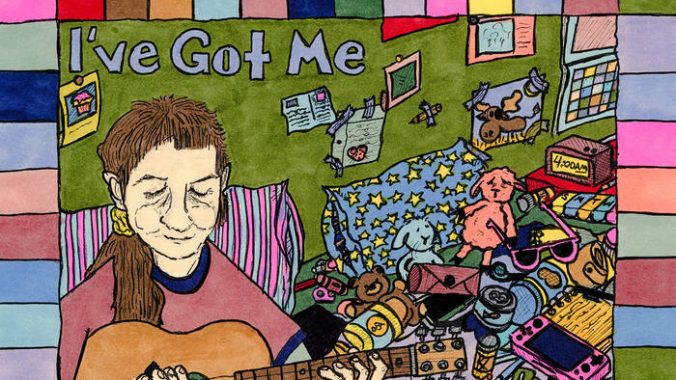On I’ve Got Me, Joanna Sternberg Keeps Going
The DIY musician’s multifaceted new album tracks a dogged healing process through 12 reflective chapters

Joanna Sternberg contains multitudes. Their music escapes easy definition: Drawing from their career as a stand-up bassist and a family legacy of comedy, Yiddish theater, and opera, it’s grounded in formal music expertise while still maintaining a distinctly DIY sound. Their 2021 album Then I Try Some More built off of this complexity to relate despair with whimsy, exploring depression and hopelessness with penguin metaphors and piano keys. This won them a brush with virality, as well a touring spot with Conor Oberst. When the COVID-19 pandemic halted that tour, Phoebe Bridgers praised Sternberg’s work in a homebound “What’s In My Bag” video for Amoeba Music. Holding up a copy of Then I Try Some More, she praises the album art and insists “I think everything they touch turns to gold.”
In the midst of all this praise, Sternberg was secluded in the walls of Manhattan Plaza, writing the music that would become their next album: I’ve Got Me. Established as an artists-only residential community in the 1970s, Manhattan Plaza is a New York legend that has housed greats from Charles Mingus to Larry David, but I’ve Got Me is entirely Sternberg’s own. Out today via Fat Possum Records, all the artwork and instrumentation was done by themselves, and it’s their debut recording as an electric guitarist, string arranger and drummer. This is fitting for an album that’s distinctly preoccupied with the struggles of self-love.
The songs on I’ve Got Me start simply, then bloom into playful complexity. The title track builds off of the themes of Then I Try Some More, exploring the ways that a commitment to growth can mask self-destruction. “I’ve Got Me” almost starts off as a pep talk before the edge creeps in, with Sternberg picking behind a sing-songy “all my faults and flaws and lies are no one’s fault but mine.” But where “This is Not Who I Want to Be” went external two years ago, hoping for another person to come along and force a change, “I’ve Got Me” dreams of breaking out of these patterns. It’s a struggle that continues throughout the album, as Sternberg tracks a dogged healing process through twelve deeply reflective tracks.
-

-

-

-

-

-

-

-

-

-

-

-

-

-

-

-

-

-

-

-

-

-

-

-

-

-

-

-

-

-

-

-

-

-

-

-

-

-

-

-








































